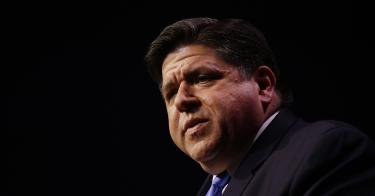Illinois lawmakers recently moved one step closer to raising state income taxes. It’s the last thing Illinois needs—residents and businesses are already leaving the state in droves due, in large part, to the inhospitable tax climate.
The irony is that the same politicians who are about to pass these tax hikes have been howling for more than a year about the 2017 federal tax cuts, which they say raised taxes on the state.
But that’s hardly true. More Illinoisans actually got a tax cut than taxpayers in 21 other states. The much-decried state and local tax deduction cap—which Congress adjusted in order to treat states more equitably—didn’t change the fact that the average Illinoisan received a tax cut.
Yet now, it’s the state’s own politicians who are trying to jack up residents’ taxes with a progressive income tax. Such a proposal could more than reverse taxpayers’ gains from the federal tax cuts.
Thanks to those tax cuts, workers across Illinois last year kept, on average, $1,265 more of their hard-earned money—the 12th-largest tax savings among all states. Families of four benefited even more, with average tax cuts of $2,381 in 2018.
The fact that the vast majority of Illinois taxpayers benefited hasn’t stopped politicians from claiming otherwise—and to their own political success. Newly elected Reps. Sean Casten, D-Ill., and Lauren Underwood, D-Ill., campaigned on the issue in 2018 and defeated Republican incumbents.
Both decried the new $10,000 cap on the state and local tax deduction, claiming that it harmed wealthy taxpayers in Illinois. They have even backed legislation in Congress to raise the cap.
But the numbers paint a different picture. Taxpayers in Casten and Underwood’s districts received average tax cuts of $2,054 and $1,659, respectively, according to Heritage Foundation calculations using IRS data.
Taxpayers made out so well because the state and local tax deduction cap was more than offset by a doubled standard deduction, lowered tax rates on all income, and a higher exclusion for the personal alternative minimum tax.
The latter provision actually increased the state and local tax deduction for 5 million Americans.
But facts aside, politicians continue to spread misinformation about the tax cuts.
Last year, Illinois state legislators tried to pass a workaround to the state and local cap by establishing a sham charity that allowed residents to claim a federal charitable tax deduction in lieu of the state and local deduction if they paid their property taxes to the state charity. That effort ended when the IRS shut it down.
The reason lawmakers in Illinois and other high-tax states liked the old, unlimited state and local tax deduction is that it masked the damage caused by their own high tax burdens.
It allowed taxpayers to write off local tax increases on their federal income taxes. So, when Springfield raised taxes, Illinoisans could write it off on their federal income taxes and be shielded from the effects of bad Illinois policy.
Of course, this made it easier for state lawmakers to keep raising taxes without feeling the political blowback they should naturally receive.
The Democrats’ laser focus on the state and local cap might lead one to think Illinois politicians have finally realized that their residents are overtaxed. But that would be mistaken.
This past May, the Illinois State House voted to amend the state constitution to move from a flat tax to a progressive income tax. The proposal is now set to appear on the 2020 ballot. If approved by 60% of voters, it will become law—and likely expedite the mass exodus from Illinois.
Democratic Gov. J.B. Pritzker claimed that 97% of taxpayers would see no tax increase under the proposal, but Illinois voters know better by now than to trust the promises of their politicians.
It’s impossible for Pritzker to even make that claim, since the ballot initiative doesn’t include official tax rates or brackets. It may come back to bite many who didn’t expect to be hit by it.
Even if Pritzker’s promise was trustworthy, a tax hike of any kind is the last thing Illinois needs.
In 2011, Illinois lawmakers voted to “temporarily” raise the state income tax from 3% to 5% to pay off the state’s backlog of bills. Low and behold, the rate is now permanently set at 4.95%.
In addition, the state is running a deficit of more than $3 billion, and still has at least $134 billion in pension debt—one of the worst pension crises in the nation.
Meanwhile, other states like Kentucky and North Carolina are becoming more taxpayer-friendly by moving to a flat income tax. This is the wave of the future. In fact, Connecticut is the only other state in the last 30 years to have moved in the other direction and implement a progressive income tax.
Connecticut residents have learned how the progressive income tax removes any last protection against tax hikes—politicians are free to tinker with brackets and raise rates as they see fit—and that it does not guarantee financial stability.
After embracing the progressive tax, the average income tax burden in Connecticut increased by 13%. Other taxes also increased, yet the state remains burdened with debt.
With massive unfunded pension liabilities and a tax base shrinking due to unprecedented population loss, it’s all but certain Illinois taxpayers will be shelling out more and more in state taxes unless Springfield cuts its spending habits.
One thing should be clear: The 2017 tax cuts are not forcing Illinois taxpayers to pay more in taxes to Washington. The feds cut taxes for almost everyone. It is the state’s own politicians who want to raise taxes through a new progressive income tax.
Rather than pushing more tax-and-spend policies, which will never dig the state out of its crisis, Illinois lawmakers should work to put the state on a path toward fiscal solvency through spending cuts and pension reform.
This piece originally appeared in The Daily Signal



